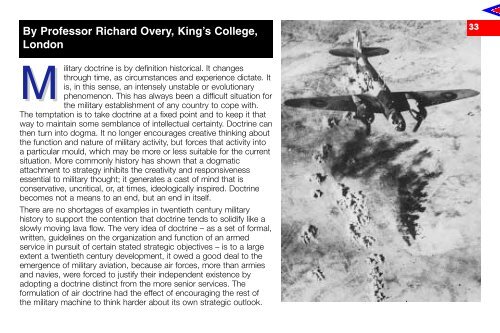THE RAF AIR POWER REVIEW - Royal Air Force Centre for Air ...
THE RAF AIR POWER REVIEW - Royal Air Force Centre for Air ...
THE RAF AIR POWER REVIEW - Royal Air Force Centre for Air ...
Create successful ePaper yourself
Turn your PDF publications into a flip-book with our unique Google optimized e-Paper software.
By Professor Richard Overy, King’s College,<br />
London<br />
33<br />
Military doctrine is by definition historical. It changes<br />
through time, as circumstances and experience dictate. It<br />
is, in this sense, an intensely unstable or evolutionary<br />
phenomenon. This has always been a difficult situation <strong>for</strong><br />
the military establishment of any country to cope with.<br />
The temptation is to take doctrine at a fixed point and to keep it that<br />
way to maintain some semblance of intellectual certainty. Doctrine can<br />
then turn into dogma. It no longer encourages creative thinking about<br />
the function and nature of military activity, but <strong>for</strong>ces that activity into<br />
a particular mould, which may be more or less suitable <strong>for</strong> the current<br />
situation. More commonly history has shown that a dogmatic<br />
attachment to strategy inhibits the creativity and responsiveness<br />
essential to military thought; it generates a cast of mind that is<br />
conservative, uncritical, or, at times, ideologically inspired. Doctrine<br />
becomes not a means to an end, but an end in itself.<br />
There are no shortages of examples in twentieth century military<br />
history to support the contention that doctrine tends to solidify like a<br />
slowly moving lava flow. The very idea of doctrine – as a set of <strong>for</strong>mal,<br />
written, guidelines on the organization and function of an armed<br />
service in pursuit of certain stated strategic objectives – is to a large<br />
extent a twentieth century development, it owed a good deal to the<br />
emergence of military aviation, because air <strong>for</strong>ces, more than armies<br />
and navies, were <strong>for</strong>ced to justify their independent existence by<br />
adopting a doctrine distinct from the more senior services. The<br />
<strong>for</strong>mulation of air doctrine had the effect of encouraging the rest of<br />
the military machine to think harder about its own strategic outlook.

















